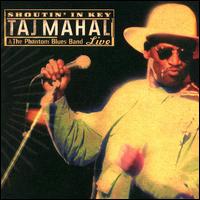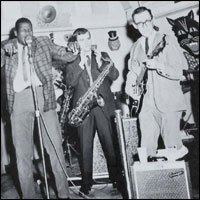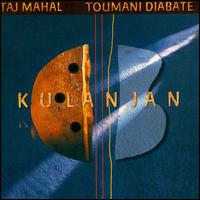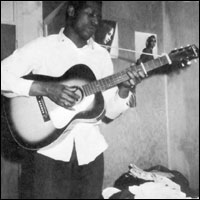 Two-thirds
of the way through Taj Mahal’s nearly two-hour set on November 14 at
the Calvin Theatre, you couldn’t help but notice a “psychic”
shift in the hall. From then on, the intensifying surge of music, like
some drop-in life force, took over completely, pushing into the
background things like personal individuality and that old time
audience-musician dichotomy. Reigning supreme was neither the band nor
even Taj himself, but the super-octane music; everything else was mere
background noise. For the concert’s final thirty minutes, everyone
in the house was on his feet-shaking to the max -- all the more
remarkable considering that two-thirds of the faithful were aging
boomers, more than a few of them orthopedically challenged. Two-thirds
of the way through Taj Mahal’s nearly two-hour set on November 14 at
the Calvin Theatre, you couldn’t help but notice a “psychic”
shift in the hall. From then on, the intensifying surge of music, like
some drop-in life force, took over completely, pushing into the
background things like personal individuality and that old time
audience-musician dichotomy. Reigning supreme was neither the band nor
even Taj himself, but the super-octane music; everything else was mere
background noise. For the concert’s final thirty minutes, everyone
in the house was on his feet-shaking to the max -- all the more
remarkable considering that two-thirds of the faithful were aging
boomers, more than a few of them orthopedically challenged.
It is Taj Mahal’s astonishing gift
to be the lightening rod -- the channeler, if you will -- through
which some sort of preternatural musical superforce flows. Pioneer
Valley folklorist Jeff Lee and I had gone down to the concert hoping
to catch a whiff of Taj the archivist and Taj the country blues
alchemist. Instead, we got the “electric show,”* propelled by the nine-piece Phantom
Blues Band, featuring guitars, bass, drums,
and keyboards, all lifted higher by trumpet, saxophone, and Taj
himself. Sporting characteristic shades, wide-brimmed straw hat and
his raspy baritone, Taj -- who grew up in Springfield, graduated from
UMass, and was an apocryphal member of the folklore society --
frequently strutted and swayed about the stage peppering a tambourine
or slapping a cowbell with his drumstick. (Less frequently he played
guitar and harmonica.) “I know you’re dying to get out of those
chairs,” he coaxed the audience before everyone did in fact opt for
undulating variations of verticality. Taj and the band broke down
audience resistance with salvo after salvo of straight-ahead
uncluttered but virtuosic musicianship. Accelerating tempos and scarce
down-time between numbers also fueled the frenetic build up.
“electric show,”* propelled by the nine-piece Phantom
Blues Band, featuring guitars, bass, drums,
and keyboards, all lifted higher by trumpet, saxophone, and Taj
himself. Sporting characteristic shades, wide-brimmed straw hat and
his raspy baritone, Taj -- who grew up in Springfield, graduated from
UMass, and was an apocryphal member of the folklore society --
frequently strutted and swayed about the stage peppering a tambourine
or slapping a cowbell with his drumstick. (Less frequently he played
guitar and harmonica.) “I know you’re dying to get out of those
chairs,” he coaxed the audience before everyone did in fact opt for
undulating variations of verticality. Taj and the band broke down
audience resistance with salvo after salvo of straight-ahead
uncluttered but virtuosic musicianship. Accelerating tempos and scarce
down-time between numbers also fueled the frenetic build up.
And then there was the eclectic
repertoire, affirming that Taj the archivist was indeed in the house.
There were juiced-up country blues distillations like Taj’s own Goin’
to the Country and EZ Rider. Horn driven soul and funk
classics like Curtis
Mayfield’s Stranger in My own Home Town, Hank Ballard’s Hoochy
Coochi Coo, and Banks and Parker’s Ain’t that a Lot of Love.
And feel-good international concoctions, including Cape Verdean jazz
great Horace Silver’s Senior Blues and an unmistakably West
African infused rendition of Queen Bee. “You all been
watching that American Roots Music series on PBS? It’s been
wakin’ folks up to where things come from,” he noted in a rare
prescriptive moment. Later in the show, Taj introduced his
seventy-something-year-old stepfather, Hughan Williams, to the wildly
enthusiastic audience. “He’s why I play the guitar!” Taj
proclaimed with Williams by his side. By the concert’s end, Hughan
William’s stepson had uncorked a Methushelah of endorphins for the
Calvin crowd. The event ended with Taj and the audience locked in a
call-and-response duet that an outsider might have mistaken for
nonsense syllables. Curtis
Mayfield’s Stranger in My own Home Town, Hank Ballard’s Hoochy
Coochi Coo, and Banks and Parker’s Ain’t that a Lot of Love.
And feel-good international concoctions, including Cape Verdean jazz
great Horace Silver’s Senior Blues and an unmistakably West
African infused rendition of Queen Bee. “You all been
watching that American Roots Music series on PBS? It’s been
wakin’ folks up to where things come from,” he noted in a rare
prescriptive moment. Later in the show, Taj introduced his
seventy-something-year-old stepfather, Hughan Williams, to the wildly
enthusiastic audience. “He’s why I play the guitar!” Taj
proclaimed with Williams by his side. By the concert’s end, Hughan
William’s stepson had uncorked a Methushelah of endorphins for the
Calvin crowd. The event ended with Taj and the audience locked in a
call-and-response duet that an outsider might have mistaken for
nonsense syllables.
A half hour later, with the
performance over and the energy level returning to some semblance of
normalcy, we headed backstage for a rendezvous with Taj for some oral
history about the early days of the folklore society. (In his day it
was the Connecticut Valley Folklore Society.) Before chatting with us,
the Springfield native talked farming with two well-wishers from his
back pages: the first from the Langevin dairy farm in Palmer, where
Taj had interned and worked during his high-school and UMass
Stockbridge years; the second-another dairy farmer -- a fellow
graduate from Taj’s class at Westfield High. (Taj lived in
Springfield but went to Westfield High for its agriculture program.)
In the company of farmers, the avidly interested Mahal asked one
question after another -- How were family and friends? How were the
livestock and the local economy? Taj talked with passion and
authority about field use and machinery; feed and soils. No doubt
about it -- this famous guy was a hell of a lot more grounded than I
was.
In Taj’s dressing room, melting
into a retinue of a dozen or so admirers (including his stepfather), we
got a few answers to some questions of our own. Taj was not a founder
of the folklore society, but was extremely active in an early wave of
folk roots enthusiasts who galvanized the group. According to Taj,
most members of the society back then were UMass students. (Taj
entered UMass in the fall of 1960 and graduated with an associates
degree in animal science in 1963.  He
minored in veterinary science and agronomy.) The society’s hangout
was the Saladin Coffee House, a privately owned, less than antiseptic
rooming house that became the central meeting place of the campus folk
and counterculture scene. “It was right in the middle of the campus
[near the present-day Newman Center]; the coffee house was downstairs,”
Taj reminisced. “One of the roomers was a Korean opera tenor, who
was always vocalizing upstairs. It was a very lively scene.” So was
Harvard Square and the legendary Club 47, both national Meccas for
folkies that exerted an energizing pull on Taj and his UMass crowd.
Did Taj remember the names of any of his folklore society accomplices?
No problem. “There was Horace Waters, Tom Azarian, Andy Leader,
Peter Gazark, John Tuttle, Bob Wolfong, David Beauvine, Bob Webber,
Karen Burgess, and a guy we called “Scratch,” Taj replied without
missing a beat. “And Buffy [St. Marie] was big. She made her first
album while still at UMass student.” How could Taj-forty years
later-roll out that litany so effortlessly? “That’s easy, I
remember them because I see folks as people,” he emphasized. He
minored in veterinary science and agronomy.) The society’s hangout
was the Saladin Coffee House, a privately owned, less than antiseptic
rooming house that became the central meeting place of the campus folk
and counterculture scene. “It was right in the middle of the campus
[near the present-day Newman Center]; the coffee house was downstairs,”
Taj reminisced. “One of the roomers was a Korean opera tenor, who
was always vocalizing upstairs. It was a very lively scene.” So was
Harvard Square and the legendary Club 47, both national Meccas for
folkies that exerted an energizing pull on Taj and his UMass crowd.
Did Taj remember the names of any of his folklore society accomplices?
No problem. “There was Horace Waters, Tom Azarian, Andy Leader,
Peter Gazark, John Tuttle, Bob Wolfong, David Beauvine, Bob Webber,
Karen Burgess, and a guy we called “Scratch,” Taj replied without
missing a beat. “And Buffy [St. Marie] was big. She made her first
album while still at UMass student.” How could Taj-forty years
later-roll out that litany so effortlessly? “That’s easy, I
remember them because I see folks as people,” he emphasized.
Taj’s reminiscences of growing up
in Springfield were no less vivid. “I was the oldest sibling. My
stepfather and mother (who held a master’s degree in childhood ed)
insisted that I set a positive example for my brothers and sisters by
going to college. That’s what we all did,” observed Taj, his
stepfather nodding in affirmation. (His stepfather, in fact, had been
a good friend of Taj’s father, Henry St. Claire Fredericks, Sr., who had died
tragically in a machinery accident several years before. A jazz
afficianado, intellectual of polymathic interests, and follower of
Marcus Garvey and his pan-African ideals, Taj’s father left his
son with an almost compulsive longing for reconciliation with his
deepest roots.
“During high school, I was an urban
guy passionate about agriculture and country blues. The kids in my
neighborhood whose families had just come up from the South [the last
wave of the great postwar migration] couldn’t believe it.” Many of
those families, he added, brought their music with them. “Next door,
a guy my age played as good as Robert Johnson. Other guys up the
street played fantastic Mississippi Delta. The blues tradition was
always in the town. I’d hear Blind Lemon and Lightnin’ Hopkins. I’d
also hear West Indian music in my own home (My father was from St. Kitts
and my stepfather was from Jamaica); and African music brought in by
foreign students at AIC (American International College). Getting
exposed to all those influences at that time -- that was like cosmic
luck.”
For Taj, listening was never enough.
“My stepfather insisted that I focus on school and agriculture, not
the guitar,” he recalled. Then one day, while playing hide-and-seek
as a teenager, Taj had an epiphany. “While hiding in a closet, I
leaned back and felt the sensuous curve of polished wood -- It was my
stepfather’s guitar. From then on, I played it secretly in the
basement. (Taj also co-opted his mother’s combs as guitar picks,
which he broke in great numbers.) “Of course, pops knew all along
what was going on. One day when I was playing in the basement, the
door suddenly opened. “Well, I see you found it,” was his
response. “That was all he ever said about it.”
Taj’s fast-lane rise to fame and
fortune after UMass is well documented. After gigging around
the folk club scene for a year and a half, he hooked up with Ry Cooder
and several other musicians in Los Angeles to form the Rising Sons.
In 1967, he signed a recording contract with Columbia Records, then
the world’s most powerful record company, whose artists included
Dylan, Miles, Monk, and Leonard Bernstein. Thirty-eight albums and two
grammys later (He currently records for the British label, Hannibal),
Taj remains true to his prime directive -- a relentless search to
discover his roots and incorporate them into his continuously evolving
musicianship. In that pursuit, he has sought out and learned directly
from country blues masters like Sleepy John Estes, Yank Rachel, and
Mississsippi John Hurt. He has invested countless hours in archival
research in the Library of Congress and in local archives. And in
nearly forty years of touring, which includes visits to a great many
counties in the United States, he has sought out the “live” music
scene to discover local and regional styles and their history.
Most recently, his search for the
deeper layers of his musical identity has brought him to Mali, where
he has passionately embraced the millennium-old Mande musical
tradition. It is a legacy of both refinement and soulfulness; of
musical troubadors (yeli or griots), who perpetuate and enrich an oral
tradition based on songs of courtly praise and connectedness with
Mande ancestors and culture. In 1999, Taj joined forces with kora**
master Toumani Diabate, and a handful of musicians from Mali to record
Kulanjan, a seamless hybrid of Mande music and American
acoustic blues that promptly won Folk Roots magazine’s album
of the year honors. Taj has written of his special affinity with the
title song, a vehicle of praise for the mythic hunter, Kulanjan, who
in the song reaffirms his mastery over conspiratorial animals. Perhaps
with the effect of counterbalancing the disproportion of seven Malian
musicians to one American on the cd, the recording did well to take
place in Athens, Georgia, in a 1920s white clapboard house on a quiet
hilly street.
In his recent autobiography, Taj
Mahal: Autobiography of a Bluesman (Sanctuary Publishing), Taj
explains the compelling attraction that drew him to the Kulanjan collaboration
and West African music: “Whenever I heard music from Western Africa,
it really got to me. I tried to hear where those sounds came from
geographically. More and more sounds that I wanted to play came from
Mali. The Mississippi sound that Skip James played, which is that long
bulong-badung-dadung-dabebadong -- that dong, that note
that goes long before he picks it up -- that is straight up Malian. It’s
exact.”
Flash backward to the concert at the
Calvin. Taj and the Phantom Blues Band have just begun playing Queen
Bee. It is the evening’s only West African-infused
collaboration. I am floored by its powers of evocation. Taj’s
semisweet baritone skims over a bed of horns that eddies against
currents of electric guitar riffs reminiscent of Ali Faka Toure. It is
a river of sound-deep sixing time and space -- with the blues flowing
into and intermingling with its African source waters. “Music out of
Africa has always been . . . sort of family, to me. The source really
was ancestors. I grew up with that idea,” observed Taj Mahal in his
autobiography, clearly reconnecting with a Garveyite inspiration of
his late father. “One thing I feel bad about in the United States is
the level of communication from generation to generation about the
ancestors. You can’t make it unless the people before you did what
they did to get you where you are. Now you have to give something up
to the universe for them, to them, about them. You have to bring them
into your thoughts. The ancestors are so powerful that they can get
around this so-called New World stuff and make the real connection.”
Without question, Taj knows power
and Taj knows humility.
|